- Home
- Adam Cesare
Mercy House Page 13
Mercy House Read online
Page 13
He let gravity take them backward, knowing that he wouldn’t be able to successfully brain her with the Maglite now. He dropped it and let it roll away as he brought his arms up and tried to disentangle her burrowing fingertips from his belly.
“Jesus!” he yelled, the curse holding some cachet with the woman, who seemed to redouble her efforts upon hearing it. The thought that he was about to be killed by a rabid church lady was too much to stand. She tore at his shirt, her fingers dancing and scraping until he put both hands around her wrist and pulled down. There was a pop and her arm hung loose at the elbow.
That taken care of, he snapped both of his arms up and broke her grip on his neck. She didn’t let go easily and her nails plucked the tendons of his shoulder like so many guitar strings, the pain excruciating but not enough to stop him.
He was in pain and not thinking straight. Which may have explained why he tried to head-butt her. He successfully mashed her nose with the top of his forehead, but his vision swam, the world around him dimming as a result of the knock to his head.
Hoping that he wasn’t going to pass out, Teddy cinched his legs around the broad and turned, trying to get her under him, the maneuver feeling like a combination of mixed martial arts and fucking. That was until she took a swipe at his cheek, a flap of skin undoing itself from his face. Then it just felt like fighting again.
Now he had the power, though, as she bucked underneath him. Good luck, lady, he thought, that’s two hundred and twenty-five pounds and all of it is dick, balls, and muscle. He punched down, alternating straight rights and lefts into her already puggish nose, every third punch slipping down to clip her teeth. Her busted incisors cut into his knuckles.
Teddy kept at it until his arms were tired, then until she’d stopped moving, then a few punches more, until he put a hand around to the back of her head and felt that it’d gone flat and soggy against the hardwood.
These motherfuckers could take some punishment.
That was three dead in this room, all of them able-bodied. If you added the one in the hallway, Teddy’s score was standing closer to three and a quarter. He looked at the scrapes on his hands, felt the flap of skin on his cheek, and hoped that he hadn’t been infected. Nah, bro, that was just in the movies. Only old folks seemed to catch it—whatever it was—here.
Winded and bloody, he took a second to think. Clearing out Mercy House may prove harder than he initially planned. He looked around the room; his tools were scattered and he tried to decide whether carrying the nail gun was even worth it, or if he should just empty the clip and leave it, neutralized so it couldn’t come back to haunt him later.
His planning was interrupted by movement from behind. He turned to look, picking up a knee from around the dead woman and edging toward the Maglite, to grab it should he need it.
The movement was the sliding door that led into the cafeteria, opening just a foot so Teddy could see the face staring at him from the threshold but nothing else of the room beyond. From the murmurs and voices he could hear, it seemed to be packed with residents.
The man opened the door a bit wider, stepped in, and closed it behind him. He was big. So much so that he made the religious fanatics that Teddy had just fought seem like dwarfs, the runts of a litter of which this was clearly the alpha male.
“Nice fanny pack,” Teddy said, standing and gathering up his bludgeon, the light flickering. He must have knocked some of the wiring loose when he’d broken that guy’s face with it. No matter, there was plenty of light to see by, with the candles.
The resident didn’t speak, but hitched up his bandolier just the same. He might have understood what Teddy had been saying, that he was ridiculing the man’s fashion sense, or it might have been a coincidence.
Jokes aside, the weapon the guy held looked nasty: a knife big and heavy enough to be of use to Teddy, strapped to a long pole of metal. If they were going to tangle, and they were, Teddy would need to put this guy down quick, then take his weapon for himself.
As the man moved closer to the center of the room, to the candles, Teddy was able to scrutinize his face. Even under the combat makeup, through the changes, Teddy knew this guy. He would recognize that mustache anywhere, even if it were pulled tight across an unfamiliar face now. He used to call this resident Rambo. He would love to tell stories about Vietnam. There were plenty of residents in Mercy House who had served, but none of them had been as forthcoming or articulate with their experiences as old Rambo.
“Rambo,” Teddy said, seeing an opportunity to try out diplomacy. He wished he could remember the guy’s actual name. Glazer? No, but something like that. “It’s me, Rambo, you’re not in the jungle, man, there’s no reason to fight. War’s over.”
Maybe if he could befriend one of these freaks, he could get out of here without getting the remainder of his fucking face peeled off.
“War? Jungle?” Rambo said, his voice deeper to match his stature and the new circumference of his chest. Rambo looked up to the ceiling, checking for an invisible canopy. He looked back down, resuming eye contact with a smile on his face. “Yes, jungle,” Rambo said.
The attack came from behind. Not from Rambo, but from whoever had slipped through the swing door from the kitchen and crept up behind Teddy while his attention was elsewhere.
That wasn’t fair, they weren’t supposed to have strategy, weren’t supposed to speak or pray or use tools or be superstrong; they certainly weren’t behaving like old people. Teddy looked down at his own chest, even that much movement taking enormous effort and causing pain.
The knife was buried up to the hilt, a leathery hand still wrapped around it, another one holding Teddy upright. The fingertips were gingerly on his clavicle, ready to catch him whichever way he happened to fall. Teddy’s pulse quickened and then slowed to a stop, as if the circuitry inside him had experienced a great blockage, which it had. The knife had been wedged soundlessly and with no real effort between his third and fourth rib.
Without meaning to, Teddy unclenched his hand and the Maglite toppled to the floor end over end, its beam flashing onto Rambo, the resident’s grotesque inhuman features going into swift focus before the bulb spun to the opposite wall. The glare reflected off the white paint was intense enough to cast his shadow. There was a tall mass standing behind Teddy, its breath hot on the back of his neck.
The knife was eased free, retracted from his heart as effortlessly as it had been placed there, and his life rushed forth from the hole, his legs going slack and buckling.
Behind him, the muscular arms lowered him to the floor, his feet curling under him so that he was left kneeling, catty-corner to the effigy of a bloodied Christ.
Teddy Reed died not long after that, still kneeling, his last prayer—that things could have been like they’d been promised to him, that he’d had a chance to have one more night with her—going unanswered.
Chapter 22
They stayed under the pile longer than they probably should have, their tenure extended by the false hope that, after their initial burst of activity, the residents of Mercy House would have tuckered themselves out. Maybe they would even decide to turn in for the night before the coming dawn.
Nope.
It was a few hours they shouldn’t have lost; Dane and Nikki both nodded off, but Paulo stayed vigilant. Well, vigilant then, which translated to exhausted now.
He looked at his watch before they glided by the doorway to the cafeteria. Inside, the party was still in full swing, possibly even a bit rowdier since they’d run out of food. The wet smack of chewing and swallowing had been replaced by the sounds of hands on flesh, either a brawl or an orgy. Paulo’s stomach turned, partly from his own hunger and partly from the awful mental images.
Still, none of the residents seemed to notice or care that three human beings, real people, were walking freely in the hallway. Maybe that initial attack in the dining room had been a fluke, maybe only some of them posed a threat. But Paulo wasn’t ready to take any chances based o
n that theory.
While they had been dozing, Dane in a medical-induced slumber and Nikki in a grief-induced one, Paulo had tried to imagine what he would do if it had been his spouse murdered in front of him. Not that he had a wife, but still, that detail only served to make what had happened to the girl extra unfathomable to him.
That she was now volunteering to be part of a gruesome scavenger hunt for her husband’s corpse was just the cherry on top. She was tough.
They stopped at the door and listened to the sounds of the dining room. There was no movement inside, from what he could tell.
“I’ll do it. Stay here,” Paulo said, squeezing Nikki’s wrist. He followed her gaze to the crumpled mound on the other side of the hallway. It was a resident who had seen better days, his blood coating the wall. It didn’t take a psychic to read what her apprehension was about: The hallway was not safe. No place in Mercy House was safe anymore, but the hallways especially.
Paulo nodded, ready for her and Dane to follow him in if they were going to. He’d separated the dining room key from the rest of the ring to reduce noise, but found that he didn’t need it. The door had been unlocked since they’d fled.
He held a hand up to them. It was an I’m not kidding stop sign that resolved itself into a One second finger. Dr. Dane just nodded, motioned him forward. Paulo could get used to that little peckerwood staying quiet. He entered the room by himself, Dane and Nikki taking his spot in the slightly offset threshold, trying their best to flatten themselves and stay undercover.
Inside, what drew the eye were not the candles but the figure in the middle of the room, surrounded by more bodies and a few upturned chairs. Paulo hadn’t liked Teddy in life, no one had, but in death there was a serenity to him, an aura of pitifulness to the bulky, angry young man that was hard to deny.
All but two of the candles had burned down to nothing, but it was easy to see what they were placed there to illuminate. Don Laurel had begun to sag under his own weight, the drywall behind him coming unfixed from the wall, ripping both the wallpaper and his hands where they’d been impaled by two steak knives.
Paulo looked away. He was bizarrely thankful that Don wore only his boxer briefs, because that meant that Paulo would not have to touch the man’s suspended body to search for the phone. He looked around the room and counted only one other body from the initial violence at the dinner. The bodies of Flores and Jones were no longer in the room.
If the phone was still in the room, the only place it could be was on the dining room table, which now doubled as the final resting place of Chairwoman Gail Donner. Paulo took two deep breaths, trying to fill the bronchi of his lungs the way he would if he were about to dive underwater. The air he sucked in from the middle of the room stank of blood and punctured intestines, but the area surrounding the table looked worse, the miasma almost palpable. A family of flies had taken up residence on Donner’s body and was probably already hard at work making babies.
His breath held, he crossed the room. He didn’t mean to, but he let most of the air out in a puff of disappointment as he got up close.
This wasn’t a tomb, or dead-Gail storage, it was a pagan altar, complete with handmade religious paraphernalia.
Among the tiny crucifixes made of Gail’s severed fingers and the Gaelic knots wound from her colon, were two cell phones, or at least it looked like there had been two of them. They were smashed and dismantled, a few of Gail’s shattered teeth pushed up inside one of the screens. What the teeth were meant to indicate, Paulo had no idea.
Paulo liked his job. He enjoyed working with the residents and had always found himself slipping into a weeklong whiskey-and-Netflix funk when one of them passed. But now that they’d changed? Looking down at the table, he knew for certain that these weren’t his patients anymore.
Geriatric PT could get dreary. His friends and colleagues who had chosen to focus on sports therapy or injured-veterans work thought he was crazy. To them, even if you did your best as a therapist, you were investing too much in patients who were naturally backsliding no matter what kind of progress you made. To Paulo, that was the point. He was in the business of improving the quality of life when it was at its bleakest. Now some lizard part of his mind regretted his choice of specialty. They should have died when they were going to, and he shouldn’t be anywhere around the ones who were still kicking. It’s not them, he told himself.
If he couldn’t find a working phone, the trip to the dining room was a bust, and a risky one. He hastened to leave the room before he noticed that Teddy’s dead eyes were pointing to a black cylinder that had rolled under the female body next to him. It was a large flashlight, combination weapon and light source, and Paulo switched it out for his pipe.
Then he was struck with an idea. He lifted the flaps on Teddy’s tool belt to see if he was right. In his left pocket was a single car key, a Toyota. A rental. Paulo put it into his own pants pocket and was happy with his consolation prizes, even though the sensation of happiness and hope, so foreign to him now, only made him feel more exhausted.
In that way, it was good that his minor victory was interrupted by a surprised yelp from the hallway. It was a female voice, Nikki’s, raised in surprise and pain.
They’d been caught.
Chapter 23
Arnold Piper and his squadmate exited the dining room as silently as they’d entered, Piper cleaning the blood off his knife with his pant leg, brandishing the nail gun. Grant had heard the activity in the former dining room while the rest of them were going through the kitchen for more supplies and alerted Piper to the brute. Erecting a church had not been a good use of manpower, but the dining room had no tactical merit, so Piper saw no problem with its formation. If it was going to pacify some of the residents of Mercy House, it meant more control for him and his troopers.
But a madman hacking up civilians?
That kind of thing had to be dealt with, no matter how much time it took away from his plan. They still needed to strip the kitchen of all tools that could have practical applications. The food was less important, but it was a bonus and could be used for trade, so Piper had posted Beaumont at the fridge door to guard it. He wasn’t planning on becoming a sheriff, but part of a leader’s role was to use his regime as a peacekeeping institution.
Grant went around the side to act as a distraction. The punk was busy with two unarmed residents and it would have been easy enough for one of the troopers to come straight at him, but that would involve risk, however slight. Wars like the one they were fighting right now, ones of indeterminate length and multiple fronts, weren’t won by throwing away personnel.
Grant would face no opposition by cutting through the cafeteria and flanking the dining room. The food in the cafeteria was all perishable anyway, so let the masses gorge themselves. More civilians milling around there meant that Arnold Piper and his men would face less resistance elsewhere.
‘d the young man’s voice call out to Grant, Piper pushed the door open just enough to slip into the room, then guided it shut with two fingers, his other hand on his blade. He was mindful of his footfalls, but it didn’t seem to matter. Grant was putting on a show and the young man was ensnared. Piper got in close and paused only for a second to take in the ruined face of the woman he was now standing over. She’d been beaten to death by this youth’s bare hands. Piper brought his knife hand around, getting his blade in between the youth’s ribs in the first go. It was more luck than practice.
As he pressed, warmth pouring over his thumb, his eyes doubled the size of the room around him with the tall grasses of Hill 66, the overgrown teenager in his arm mirroring the first man who’d met his death at the end of one of Arnold Piper’s knives.
That kill hadn’t been as clean, or as righteous. That one had been sloppy and murky, and the blood on Piper’s fatigues was still warm as he heaved up his lunch, replacing the cordite stink in his nostrils with bile because he hadn’t been sure what to feel. He could smell that same puke now and wished for
the smell of gunpowder. He’d grown to love gunpowder, and craved it now on this battlefield where all weapons lacked range.
Instead of pushing the kid over to let him die facedown, gasping mouthfuls of his own blood, Piper propped him up on his knees.
Maybe he’d done it to send a message to the boy: that his people were better than him, weren’t savages who killed unprovoked, or maybe he’d just done it to watch the plasma cascade down the boy’s shirt, the final pumps giving the stream enough force to splash Grant’s shoes.
Piper motioned for Grant to fall in line and the man did, following him back into the kitchen as Piper scooped up the nail gun. It was no replacement for a real firearm, but they could use it, even if it was just for building barricades.
Back in the kitchen, the men continued to work without his supervision and had piled everything they could possibly use onto the center countertop for his perusal. Piper removed the very best items for their use: a cleaver, a box of Sterno cans, some CO2 cartridges, and a small hand torch that worked like a miniature flamethrower. Then he allowed the rest to be gathered up in pillowcases and stashed in the refrigerator for later use or trade.
In his mind he called them his men, but they were more, and that they had allowed him to lead them was an honor.
They weren’t only men now, though. There were two women, both army wives who had been regulars at his mandatory veterans’ sessions once a month. The women bagged up the equipment with Grant’s help. Grant’s war had been in Vietnam, missing Korea by just a few years, so the man was in the same age ballpark as Piper.
Clemson’s tour was Nam, too, but he was younger, had been drafted. He’d been a tunnel rat, and had seen worse things than any of them could match.
Before the healing, Clemson had been unable to listen to the radio without shaking and shitting himself. The healing hadn’t brought him all the way back, but the change was marked. He hadn’t gained much height during the healing and was still the most compact member of the group, but he’d gotten back the bravado and tenacity that Piper recognized as good for building a squad around. Clemson would do anything to get the job done and thus inspire others to do the same.

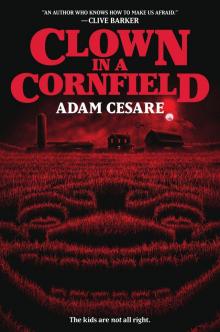 Clown in a Cornfield
Clown in a Cornfield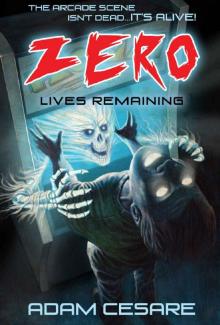 Zero Lives Remaining
Zero Lives Remaining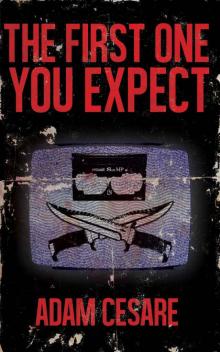 The First One You Expect
The First One You Expect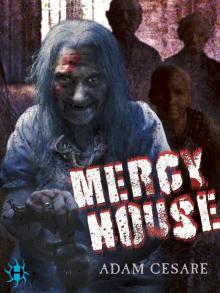 Mercy House
Mercy House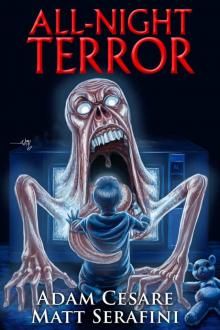 All-Night Terror
All-Night Terror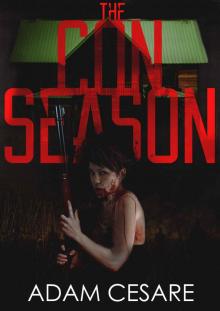 The Con Season: A Novel of Survival Horror
The Con Season: A Novel of Survival Horror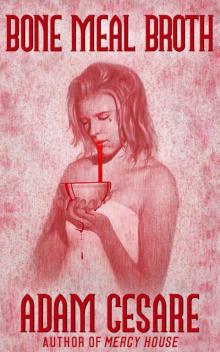 Bone Meal Broth
Bone Meal Broth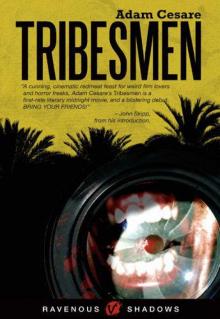 Tribesmen
Tribesmen